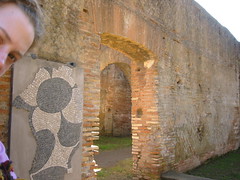It took me most of the semester to read Halldor Laxness's Independent People and all its Icelandic digressions on sheep guts and merchant cooperatives; it took me four days to read Dreams and Stones by Magdalena Tulli. But then, they are very different works. Even more different is Mile End, by Lise Tremblay, which I reread while in the thick of Laxness's novel.
How to put them all together? They do share a thread.
Independent People is the grandest in scope, putting rural Iceland and the stubborn shepherd Bjartur in an epic frame, with violent ghosts haunting sheep, World War I a distant event in the periphery, and America a destination to which a young, ambitious son escapes (and, we are told, dies). It is through Bjartur's son and daughter that we see a yearning for cities (the mysterious glories of Reykjavik never revealed)-- a tugging away from the rustic life Bjartur clings to, though conditions for the sheep and shepherds are so grim (we read of constant summer rain, green snot, heaps of snow, ring worms, and tuburculosis) it can hardly be described as pastoral.
The other two works are slender and focus their energies on those urban tugging forces. At first I thought Dreams and Stones was a novel, but it is difficult to call it that. A treatise on cities and imagination? One hundred pages of generalizations, punctuated with wonderful specificity? A long prose poem, perhaps-- a poetic myth. Trees vs. machines. City vs. countercity (our conceptions of cities). Does she say that memory = water? Or that water = oblivion? Or was there a more complex equation? There was an archaeological bend to it: dreams as stones. Stones as building blocks. Buildings, stones, as representations of our elusive dreams. Something concrete to dig our fingernails in.
There is no specific character in Tulli's work. A city emerges. Then groups of people. Workers and builders are of different classes. Our imagined Paris, Belfast, Hong Kong, New York. The A of the Eiffel Tower. The Arc de Triomphe. The mythic quality of the book complements Laxness's epic; the subject matter works well with the next and last book.
Mile End is set in Montreal. The obese narrator buries her anger under her layers of "yellow fat," drinks Southern Comfort in large glasses, and hovers toward psychosis as a mediocre pianist at a ballet school. Paris and New York are mentioned as stand-ins for other forces, influences on the Quebecquois city. So cities here have characters too, but the narrative, the characters are specific again. The language is more simple than Tulli's and Laxness's works and the underlying anger of the book seems to compel a quick read like a gust of hot air, whereas Bill Johnston's translation of Tulli's book requires a careful chewing of sentences. Laxness's book, finally, is sprawling and wonderful, but may send one's imagination careening to other places in multiple digressions (not always a bad thing). Read slowly and enjoy.
Thursday, November 01, 2007
Subscribe to:
Posts (Atom)
